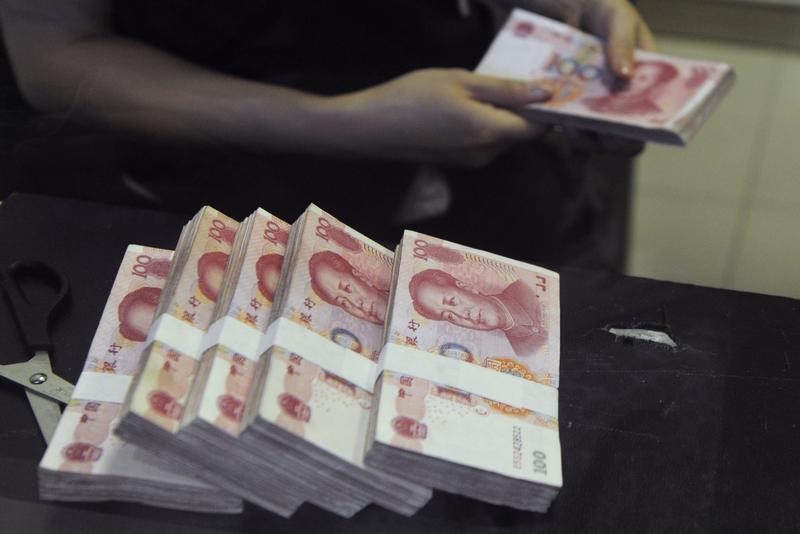(Repeats with no changes to text)
--Clyde Russell is a Reuters columnist. The views expressed are his own.--
By Clyde Russell
LAUNCESTON, Australia, Aug 13 (Reuters) - The sudden depreciation of the yuan will have flow-on effects in commodity markets, but reducing China's demand for imports is unlikely to be one of them.
The yuan has lost around 3.5 percent of its value against the U.S. dollar in domestic trade since the People's Bank of China this week took steps to devalue its currency, in a move widely interpreted as aimed at boosting the competitiveness of the struggling export sector.
The depreciation was more steep in international markets, where the yuan lost about 4.8 percent of its value as investors feared China was starting a sustained depreciation, which may lead to a global currency war.
Commodity prices, and the currencies of major natural resource exports such as Australia, also took a hit along with the yuan on the view that a weaker Chinese currency will dampen demand for imports.
Brent crude lost as much as 3.6 percent on Aug. 11, the day of the Chinese devaluation, although by the close on Wednesday at $49.66 a barrel, the decline had tempered to just 1.5 percent.
Spot iron ore lost 0.8 percent from when it lasted traded on Aug. 6 ahead of a four-day weekend in Singapore to Wednesday's $55.80 a tonne.
Converting the changes to yuan prices shows that China will only be paying marginally more for major commodity imports, such as crude and iron ore, and certainly way less than it was in recent years.
Brent crude ended Wednesday at 317.05 yuan a barrel, up 1.3 percent from the close on Aug. 10.
However, the yuan price of Brent crude has more than halved since the June last year, when it reached 716.67 yuan a barrel as Brent closed at its 2014-high of $115.06.
If anything, the yuan price of crude is currently much closer to the 250.24 a barrel from December 2008, reached at the height of the global recession.
This means that the Chinese economy is still receiving a significant boost from cheap energy prices, and the modest depreciation of the yuan so far is barely a blip in that trend.
In iron ore, the yuan price has gone from 349 a tonne on Aug. 6 to 356 at the close on Wednesday, a 2-percent drop.
However, at the end of 2013 iron ore cost 811.91 yuan a tonne and was 1,263 yuan a tonne when the spot price of the steel-making ingredient reached an all-time high of $191.90 a tonne in February 2011.
Put another way, for the price of iron ore to rise in yuan terms to what it was at the end of 2013, the Chinese currency would have to slump to about 14.5 to the dollar, assuming the dollar price of iron ore remained constant at today's prices.
YUAN TO IMPACT EXPORTS, MARKET RE-BALANCING
The relatively small movement in the yuan prices of major commodities, especially when the massive declines over the past year are taken into account, make it extremely unlikely that China's import demand will be affected by currency depreciation.
But that doesn't mean there won't be any impact at all.
China has emerged as major exporter of mildly beneficiated commodities, such as aluminium and steel products and refined fuels.
The depreciation of the yuan will make those exports more competitive, and it's likely that Chinese companies will seek to exploit any new-found advantage.
Already, China's exports of diesel have reached an all-time high of 166,000 barrels per day (bpd) in July, according to a briefing note from consultants FGE, who also flagged the possibility of higher shipments as export restrictions may be further eased.
Exports of steel products rose 9.4 percent to 9.73 million tonnes in July from the previous month, taking the year-to-date increase to 26.7 percent.
Aluminium product exports are up 28.2 percent in the first seven months of the year, while those of all refined fuels have gained 8.6 percent.
If Chinese commodity companies can secure buyers for their exports, it's more likely that this will lead to increased imports of raw commodities such as crude, iron ore and bauxite as the Chinese take advantage of their competitive currency devaluation.
Of course, the clamour for protection from Chinese exports is likely to grow louder, and it's likely that more countries will seek to impose duties and tariffs on China's commodity exports.
But the main impact of yuan devaluation is that it also causes currencies of commodity producers to decline, with the Australian dollar AUD= losing almost 1.5 percent against the greenback on Aug. 11.
This lowers the cost of production, in U.S. dollars, for Australian iron ore miners, thus allowing them to remain in business for longer in the face of low prices.
Any sustained yuan devaluation, as long as it's matched by currencies in commodity producers, will allow natural resource prices to remain lower for longer, thus inhibiting the rebalancing of oversupplied markets.
(Editing by Joseph Radford)
